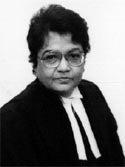Judicial Overreach or Oversight?
Justice Ruma Pal is a former judge of the Supreme Court of India who served on the bench from January 2000 to June 2006. The Honorable Mrs. Pal received her B.C.L. degree at Oxford University and started her practice in 1968 in Civil, Revenue, Labour and Constitutional matters in the Kolkata High Court. After a distinguished career as an advocate, she was appointed Judge in the Kolkata High Court in August 1990. She was appointed to Supreme Court of India on January 28, 2000, the day of the Golden Jubilee of the court. Justice Pal has delivered many critical judgments in famous cases, and has written on a number of human rights issues. She is a member of the International Forum of Women Judges and serves on the Committee of Experts of the International Labor Organization. Justice Pal also holds the Ford Foundation Chair for Human Rights at the National University for Juridical Sciences at Kolkata and is on the boards of several NGOs that work on human rights.

